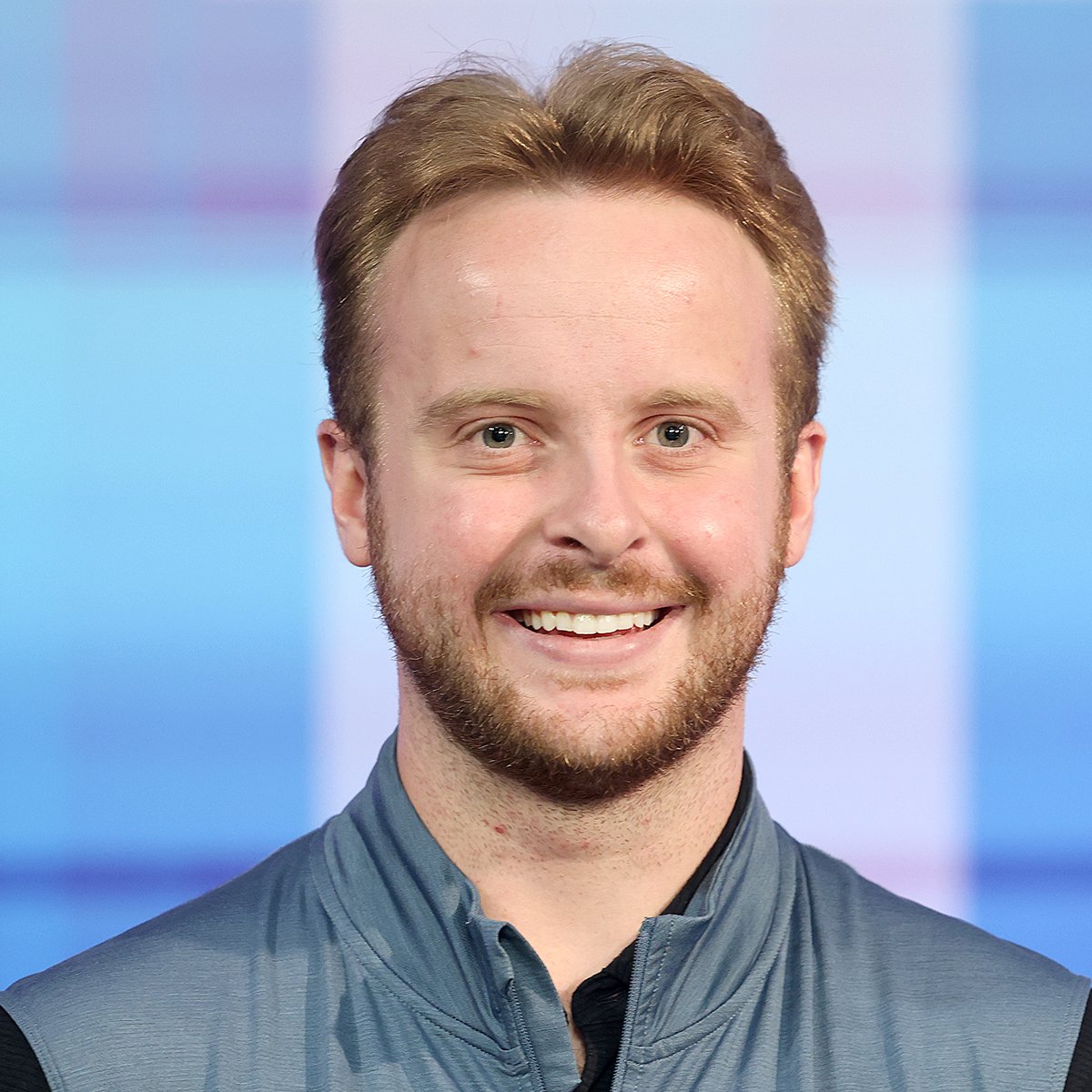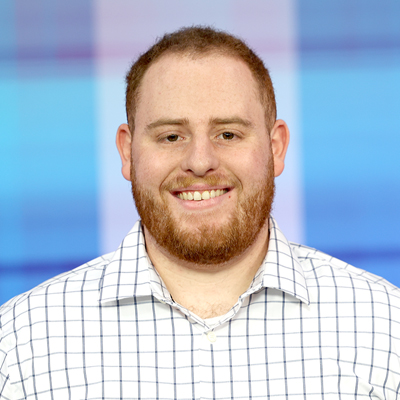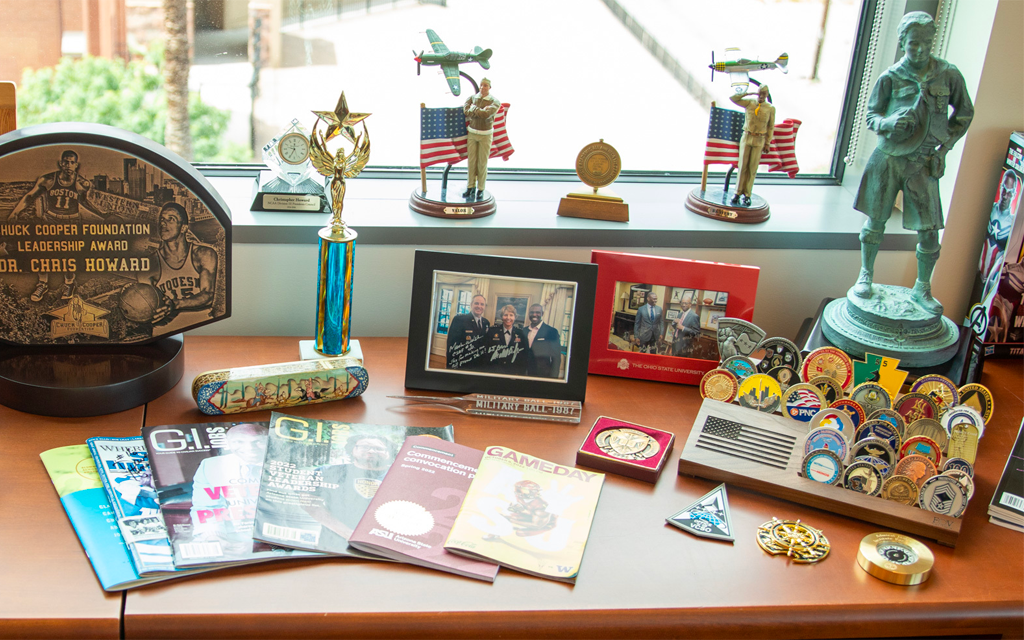TEMPE – The lessons learned in college athletics often surpass the X’s and O’s on the field. For Chris Howard, the executive vice president and chief operating officer at Arizona State, many of the lasting messages and memories from his time playing football at the U.S. Air Force Academy have helped push him to the position he is in today.
With the NCAA football regular season nearing its end, and Air Force playing its final regular season game against Boise State Friday, Howard reflected upon the impact his experiences with the Air Force Academy have had on his successful executive career.
“I think that football, more importantly for me, taught me teamwork, discipline, self-discipline and attention to detail,” said Howard, who served as the eighth president of Robert Morris University before joining ASU in 2022. “At the end of the day, it’s just about the grit and the grind. I never saw drive on the gridiron and drive in the classroom as being different. I saw them being one of the same, if not at least complementary of each other.”
In 1989, he was part of a backfield of highly skilled running backs who were competitive and successful in their work on the field, and in each of their unique career paths. Greg Johnson, the president and CEo of McAfee cybersecurity, and Maj. Gen. Rodney Lewis, a highly decorated and accomplished Air Force official, complete a backfield trio that morphed from elite athletes to disciplined executive leaders.
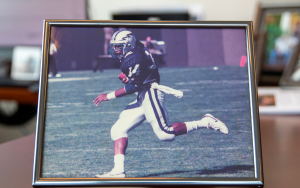
Chris Howard was a First Team Academic All-American as the starting running back on the Air Force football team and awarded the inaugural Draddy Trophy in 1990 by the National Football Foundation. (File photo by Dylan Nichols/Cronkite News)
Howard, a first team Academic All-American running back who graduated from the Air Force Academy in 1991, earned a Bachelor of Science in political science while also serving as his class president. He was a two-year starter in 1989 and 1990, helping his team to a 15-9-1 record while averaging 4.5 yards per carry.
“What was interesting is that we were all pretty good football players,” Howard said. “They were probably better than me, but we were talented football players on a very competitive team.”
That competition fueled Howard to produce a jaw-dropping resume. At Air Force, he was awarded the inaugural Draddy Trophy, which is now known as the Campbell and honors those who excel at football, academics and community service.
He was also named a Rhodes Scholar and attended Oxford before earning an MBA with distinction from Harvard Business School. In the Air Force, he worked as a helicopter pilot and intelligence officer.
After a successful stint as president of Robert Morris University, he came to ASU and is essentially university President Michael Crow’s right-hand man. He is fueled, he said, by his connection to his past.
“My great-great-grandfather was a slave,” Howard said. “My grandfather, my great-grandfather was a sharecropper. My grandfather was a sharecropper that became a factory worker. My dad was first generation college. So I have no excuses for not trying to take full advantage of what’s been offered to me in every realm.”
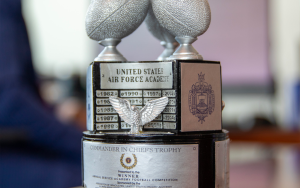
Chris Howard said playing football at the Air Force Academy taught him “teamwork, discipline, self-discipline and attention to detail.” (File photo by Dylan Nichols/Cronkite News)
Johnson, too, is grateful for the opportunities and the friends he met in the Air Force backfield.
“All along the way, you never saw it coming, but now that I’m in my 50s, I look back at the achievements,” Johnson said. “And it’s just a tremendous source of pride, you know, in in being a part of something that you didn’t know was that special at the time.”
Johnson, who played for Air Force from 1986-1989, was a two-time All-Conference player. He said his experiences were critical in elevating him to success in his own industry.
He now serves as president and CEO of McAfee, one of the largest cybersecurity companies in the world. Like Howard, Johnson attributes many of his accomplishments to his Air Force experience both on the field and in the classroom.
“Football was a way to establish yourself in a new environment. Throughout my personal and professional life, I enter a new environment with the desire to win,” Johnson said. “I just focus on understanding what my goals are, and how I can exceed those.”
Lewis is another piece of the backfield trio to rise to a high level of service. He serves as the Deputy Director for Force Protection, J8, Joint Chiefs of Staff and is headquartered at the Pentagon.
His role, as described by the Air Force’s official site, reveals an impressive laundry list of responsibilities: He “leads three Force Protection Divisions including the Joint Integrated Air and Missile Defense Organization responsible for the advocacy and integration of Joint IAMD capabilities; the Force Protection Division which identifies and develops joint requirements for asset and personnel protection; and serves as Director, Joint Requirements Office for Chemical, Biological, Radiological, and Nuclear Defense, a Chairman’s Controlled Activity.”
Not only was he a part of this star-studded backfield, but he found he had a passion for flying.
“I got my engineering degree, and then the Air Force Academy talked to me about careers and how it fits together with my major,” Lewis said. “I began to have an affinity for flying right around the same time I started playing football.”
He earned his commission in 1991 after graduating from the academy, where he was named the General John Hester Award winner for displaying the highest degree of loyalty, integrity and courage in his graduating class.
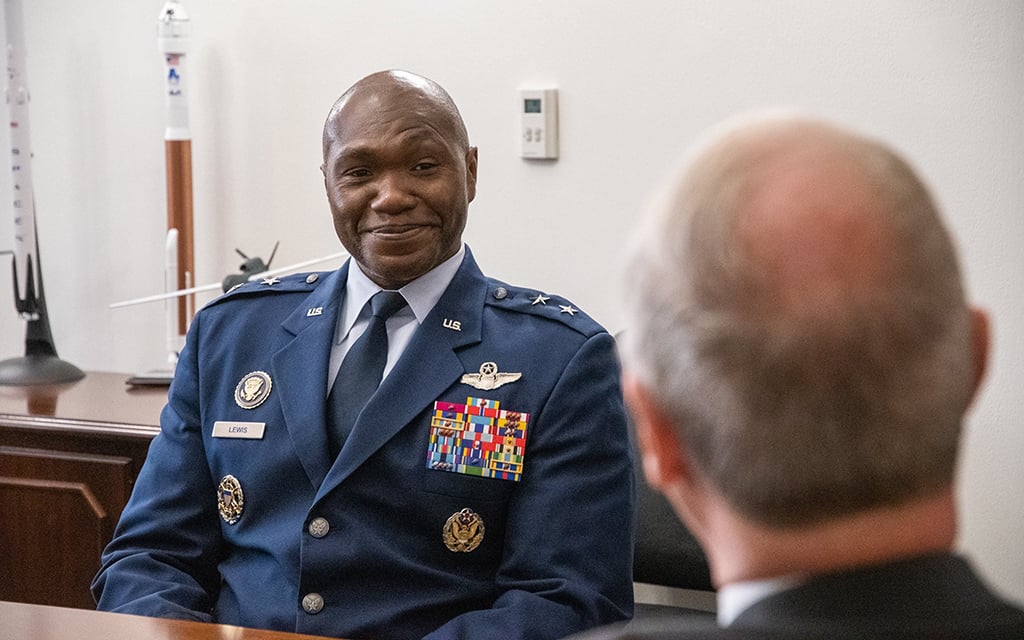
Air Force Maj. Gen. Rodney Lewis has recorded more than 3,600 flying hours and served in operations including Bosnia and Iraq. (Photo courtesy of U.S. Air Force)
He has recorded more than 3,600 flying hours and served in operations including Bosnia and Iraq.
When asked about the success of the trio, Lewis thought back to a quote by General Douglas MacArthur, the renowned military leader and West Point graduate: “Upon the fields of friendly strife are sown the seeds that on other days, on other fields, will bear the fruits of victory.”
“I didn’t know that back then, in terms of the MacArthur quote, of how being on a gridiron would lay the foundation for you to transition to life, life Greg, who I’m so proud of in the business world, and Chris, who I’m extremely proud of in higher ed world,” Lewis said. “it just prepares you for life.”
Now, all three of these former athletes are dominating in their fields, and leading their companies and teams toward a path to success.
“What makes me extremely proud is that we had such fun together, creating memories that are really, really powerful,” Howard said.
